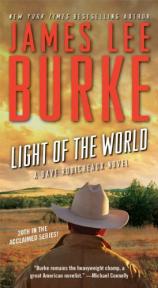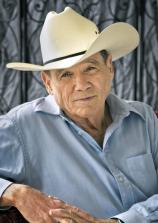Light of the World: A Dave Robicheaux Novel
Review
Light of the World: A Dave Robicheaux Novel
- Click here to read Roz Shea's review of the audiobook.
At some point, we run out of superlatives in attempting to describe the novels of James Lee Burke and the abilities that created them. With each successive book, Burke creates his own summits, often in more than one way. LIGHT OF THE WORLD, the latest in his Dave Robicheaux series, consists of some of his best writing. Most noteworthy is that it’s Burke’s ultimate examination of the theme of good versus evil, with his deepest exploration of both states. While it is easily and perhaps simplistically classified as a “thriller” or “mystery” novel, moving it out of genre fiction and into the classification of “literature” still doesn’t do the book justice; it’s something beyond that, an experience that is by turns beautiful and frightening.
LIGHT OF THE WORLD is perhaps the most allegorical of Burke’s works. It is set primarily in the Big Sky country of Montana, where Dave and others --- his wife, Molly; his friend, Clete Purcel; his daughter, Alafair; and Gretchen Horowitz, Clete’s newly discovered daughter (in 2012’s CREOLE BELLE) --- have come for an extended vacation. They are the guests of Albert Hollister, a somewhat cantankerous but loyal friend of Dave’s who, like Burke himself, is a novelist and retired English professor. The purpose of the sabbatical is to permit Dave to physically and emotionally heal from a series of injuries that he has recently sustained, and the seemingly idyllic location is perfectly suited for that. But all is not well.
"The last few paragraphs are stunning in their simplicity, more so because of the simple question asked by one of the characters of another...that is answered affirmatively. There is much more to LIGHT OF THE WORLD than its conclusion; from beginning to end, it is an unsettling and thoughtful masterpiece."
As LIGHT OF THE WORLD begins, Alafair is nearly struck by an arrow while out running, an incident that seems to be deliberate as opposed to accidental. Gretchen subsequently has a run-in with a local law enforcement officer who has a somewhat twisted agenda that runs far deeper and darker than appears at first blush. What is most chilling of all, however, is Alafair’s feeling that she is being followed by a man who bears a startling resemblance to serial murderer Asa Surette. Alafair had interviewed Surette for a magazine article while he was incarcerated several years previously; the article presented Surette in a markedly unfavorable light. But the man was killed in a fiery motor vehicle accident during a prison transport, which raises the question of how he could possibly be following her now. And who --- or, perhaps more accurately, what --- is leaving mysterious and terrible messages on the walls of a cave above Hollister’s property? Alafair has trouble persuading local law enforcement to take her fears seriously.
As for Dave and Clete, their reputations, for good or ill, precede them, which makes their relationship with the small town authorities abrasive and uneasy at best. A very unconventional rodeo cowboy interjects himself into the mix to make things even more interesting, if that is possible, while Clete finds himself romantically involved with the wife of a local land baron who may or may not have more than her own interests at heart. At the book’s core, though, is the issue of whether the mysterious figure who is stalking Alafair is of this world. Burke has dealt with the afterworld and its intersections with this side of the veil in a number of his novels, but never quite like he does here. The question may be resolved by book’s end, or it may not; it ultimately depends on your perspective. Burke also deals in a very subtle manner with Dave’s aging; while his physical abilities are, to be kind, somewhat diminished, his spirit remains strong.
One finishes the book with the feeling that the Robicheaux series not so much has ended, but that the torch is being passed. Burke has indicated that he has no idea what is coming next until he actually sits down and begins to write. The last few paragraphs are stunning in their simplicity, more so because of the simple question asked by one of the characters of another (you’ll have to read the book to see what it is) that is answered affirmatively. There is much more to LIGHT OF THE WORLD than its conclusion; from beginning to end, it is an unsettling and thoughtful masterpiece. Anyone who has read Burke, whether it be a novel here or there, or each and every word the man has written, would answer the same: Yes! Very strongly recommended, for newcomers and longtime fans alike.
Reviewed by Joe Hartlaub on July 26, 2013





